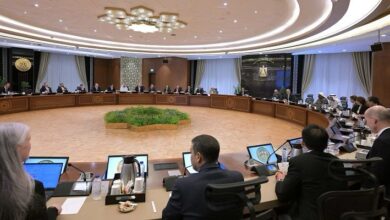It seems that the alarm bells are tolling to deaf ears. The socioeconomic situation in Egypt has become critical. Labor protests are increasing unabated. According to the Children of Earth Foundation for Human Rights, Egypt saw approximately 1,370 protests between May 2011 and April 2012. This is double the highest recorded annual rate of social protests in recent years.
But it is not odd that social protests have doubled since the revolution. These protests reflect an unbalanced situation in which relative political gains were made while no social gains were achieved at all. The failure to issue a law on professional syndicates’ freedoms provides clear proof of that. A draft law was submitted to the Supreme Council of the Armed Forces and the now-dissolved Parliament, but neither bothered to approve it.
Of course this is quite strange. While workers showed signs that they were ready to organize their ranks and negotiate their legitimate rights with officials, nobody gave them attention. In fact, government departments mostly insisted on dealing with the new trade union leaders not as leaders seeking to organize and defend workers, but as leaders of unorganized protest movements, with the hope of undermining their legitimacy and weakening their position.
If officials in the new government do not realize the danger of reproducing the same pattern of old relationships, the country will be plunged into darkness. Band-Aid solutions routinely adopted by the former regime will not work; there is a need for more radical structural reforms. The first change should be to prepare a structural framework for work relationships. Rather than just watching passively, the state should organize, though not necessarily interfere in, labor issues. The second reform is related to socioeconomic policies. A discourse which focuses on economic development and ignores redistribution of wealth is worrying. Such an orientation neglects the standing social inequalities and sets an economic agenda that ignores social justice.
The labor movement, meanwhile, is increasingly in need of organization in its ranks, despite the difficulties it has experienced. Workers will not be able to affect economic relationships in a way that serves their interests unless they satisfy three conditions. The first condition is related to their ability to organize trade union activity at a higher rate compared to the current percentage of employed workers.
If, according to the Central Agency for Public Mobilization and Statistics (CAPMAS), the total labor force is 23.346 million workers, of whom 61.2 million are salaried, this means that we need extra efforts to add unorganized labor to the new trade union frameworks.
The second condition has to do with workers' ability to have a strong presence in specific economic or service sectors. It seems that the new trade unions have a relatively strong presence among employees in government sectors, which gives them greater ability to have an organized impact and exert pressure.
Their presence, however, is still weak among workers in the industrial field, which requires greater work on their part because workers in this field usually suffer from difficult working conditions.
The third condition has to do with establishing channels for political communication, which is common in all countries of the world where trade unions have links with political parties that defend their interests and ensure that workers' demands find their way onto the agendas of political officials. Workers should try to temper their long-standing suspicion of political parties, and form interest-based alliances in which both sides can benefit.
Indeed, the road may be long, but this would be an important first step.
Nadine Abdalla is a PhD Fellow at the German Institute for International and Security Affairs.
Translated from Al Masry Al Youm by Dina Zafer.




